One of the ways through which we can see the changes of fashion is our approach to accessories. Yep, we still wear gloves and hats in winter, but they’re of a very different style to earlier periods.
Few people still wear hats as a habitual part of an outfit, and when was the last time you saw women wearing gloves unless it was bitterly cold?
Yet accessories are just as fraught with superstition and folklore as clothing and footwear. After all, they’re portable, and therefore, we’re more likely to lose them. But does that mean anything, other than the fact we were distracted?
Let’s find out!
Hats
The relative lack of people wearing hats now, aside from baseball caps and beanies, means many of the superstitions around hats are obsolete. When was the last time you saw someone even wearing a hat, let alone tipping it in greeting?
Many of the superstitions from the 1903 Encyclopaedia of Superstitions for women’s hats are likewise outdated since they refer to bonnets. For example, if your bonnet strings came undone, it meant you’d go to the theatre (Daniels 2003 [1903]: 459).
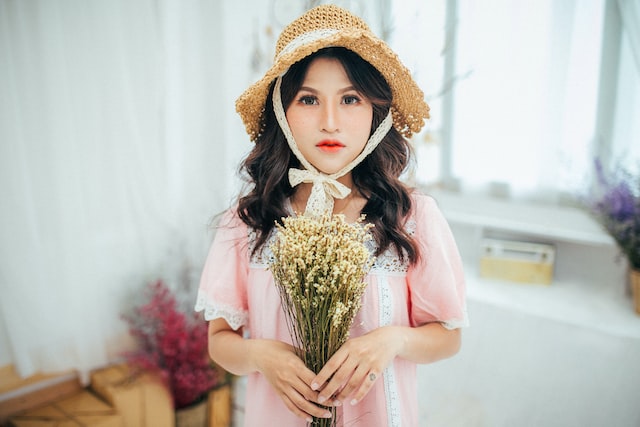
That said, I’ve chosen superstitions here that could still potentially work for other kinds of hats. I honestly think people wearing fedoras should make a comeback.
Slightly random superstitions about hats
People believed that wearing a new hat for the first time on Easter Sunday meant they wouldn’t be pooped on by any birds for the rest of the year (Opie 2005: 131).
Burning a hole in your hat meant you’d have a sore head soon (Daniels 2003 [1903]: 458). The superstition doesn’t specify if you were wearing the hat when you did the burning.
Keeping a hat on the table meant you were disappointed, while sitting on your hat meant you were in love (Daniels 2003 [1903]: 459).
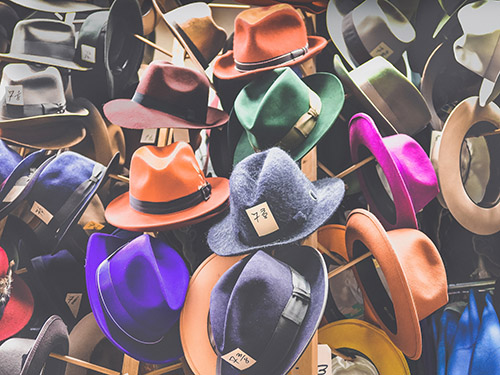
Don’t hang a hat on a doorknob because whoever was present would die (Daniels 2003 [1903]: 459). And putting on a hat of someone who was in mourning meant you too would be in mourning before the end of the year (Daniels 2003 [1903]: 194).
If you forgot where you’d left your hat and spent a long time looking for it, something unpleasant would happen to you (Daniels 2003 [1903]: 459).
The inevitable link with luck
Hats also had a lot to do with luck. Putting your hat on the bed brought bad luck, as did putting your hat on before your shoes. In some places, putting your hat on the bed was bad luck because it meant the homeowner or someone in their family would die (Daniels 2003 [1903]: 410). It was also bad luck for a man to leave his hat on at a public meeting where he should take it off (Daniels 2003 [1903]: 525).
If you see a funeral procession, ward off bad luck by removing your hat (Destefano 1969: 49).
But if your hat blew off, you should wish for good luck and it would be yours! Spit into a new hat before wearing it for good luck whenever you wore it (Daniels 2003 [1903]: 459). You could also put a postage stamp on the inside hatband to bring luck (Daniels 2003 [1903]: 484).
But be careful. If a high wind stole your hat, you’d soon be frightened. That said, if your hat blew off, it also meant you’d soon hear good news (Daniels 2003 [1903]: 459).
The Rally Cap
Ryan Muckerheide also told me on Twitter about the “rally cap”, a recent American baseball tradition that sees fans turn their cap inside out if their team isn’t doing so well. Ryan explained this was a way to reverse fortunes.
According to Urban Dictionary, you need to turn the cap inside out in a stadium, and it works best in the late innings. There are other, somewhat gross meanings to the term, but we’ll go with the baseball one since it’s more pertinent here.
Be Careful How You Wear Your Hat
In one superstition, wearing your hat on the back of your head meant you’d be kind to your wife. Yet in another, it meant you were a coward, and most likely an actor.

If you wore it on the right, you loved a good argument. Wearing it on the left meant you were shy and melancholic. Those who wore it square on the top of the head were tidy, businesslike and proud, while those who wore them low on the forehead were rogues.
Even the way you lifted your hat in greeting was important. Those who lifted their hat high were courteous and well-mannered. Those who lifted their hat straight up and down would make a good soldier (Daniels 2003 [1903]: 460).
Gloves
Gloves are perhaps a more personal item than hats. Like shoes, they mould to the wearer, forming more of a link than, say, a belt does.
Plus, the fact you generally have two of them means you’ve got double the items to keep track of, unlike hats.
If you drop your glove and pick it up, a disappointment will come your way. But if someone else picks it up, then you’ll get a surprise! If they pick them up and give them to you, don’t say thank you (Opie 2005: 174).
Gloves and Friendship
It’s unlucky to either pick up or drop a glove. Avoid giving anyone gloves or it will break the friendship (Destefano 1969: 49).
That said, some think it’s only if you give the gloves to someone of the opposite sex. And if someone gives you gloves, give the gifter a token payment for them (Opie 2005: 174). This is similar to the superstition that requires you to give the gifter a coin if they give you scissors or a knife. Except the scissors/knife one is to prevent you from “cutting” the friendship. I’m not sure of the logic behind token payments for gloves.
Elsewhere, people think giving gloves as a gift will mean you’ll argue (Opie 2005: 174).
Want to cement friendship with someone? Exchange right gloves with them (Daniels 2003 [1903]: 456).
People used to give each other gloves as a symbol of faith. And we’ve all seen the films where someone throws down their gloves to challenge them. It goes further: if you bit your gloves while looking at someone, it meant you wished them ill (Daniels 2003 [1903]: 456).
And “if you drop both of your gloves, your lover will meet you soon”. It’s unclear if that still works if you drop them on purpose (Daniels 2003 [1903]: 456).
Death Omens Involving Gloves
If someone leaves a pair of black gloves at your home and you find them, it means someone in your house will die (Daniels 2003 [1903]: 456). It’s also bad luck to keep the gloves you wear as a pallbearer (Daniels 2003 [1903]: 195). Make sure your mourning gloves are made from cotton, or one funeral will follow another until your house is empty (Daniels 2003 [1903]: 192).
Stretching your gloves for a better fit? Be careful they don’t rip. If they do, it means someone wishes you ill (Daniels 2003 [1903]: 456).
In fact, there was a whole rhyme about tearing your glove.
“Tear the thumb you tear for danger,
(Daniels 2003 [1903]: 456)
Tear the finger you tear for mirth,
Tear the hand you tear for love,
But if you wish good luck don’t tear at all.”
The Language of the Glove
Somewhat unsurprisingly, there’s an entire language involved with what you did with your gloves. Now, this has its own issues, because if everyone knew what a gesture meant, then anyone looking at you could still follow your meaning. That’s probably why twirling your gloves around the fingers meant “We are watched”.
But still… it would be interesting to know how popular this was. Was it like the language of flowers, that may have been a cool idea but rarely practiced?
So you could say “I love you” by dropping both gloves.
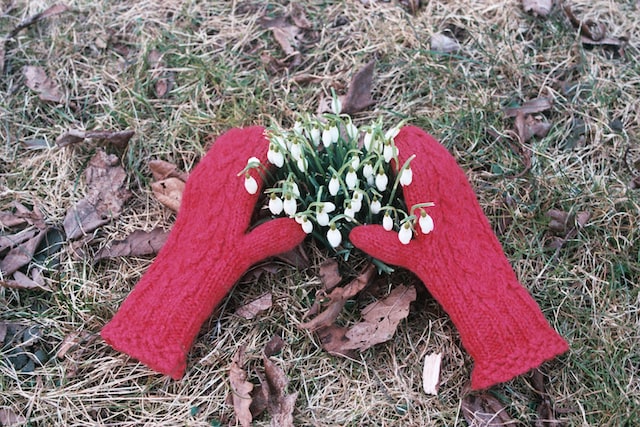
If you pulled the glove halfway onto your left hand, it meant ‘indifference’. Be careful though, having the left glove halfway on but with the thumb exposed asked the other person if they loved you. The same position on the right hand meant ‘Kiss me’.
Striking the glove on the hand meant ‘I am shocked’, while biting the tips meant ‘I wish to be rid of you’. Turning them inside out meant ‘I hate you’, and putting the gloves away meant ‘I am vexed’.
Clinching the glove and rolling it up meant either yes or no – no for the right hand, yes for the left.
Striking your glove over your shoulder invited the other to follow you, though striking the chin meant you loved another. Using them as a fan meant “Introduce me to your company”, but carefully folding them up meant “Get rid of company”.
Belts
Other accessories have fewer superstitions about them, and they tend to be a little more consistent.
If you find your belt is twisted, it’s a sign you are in love. It can also mean you’ll have twins (Opie 2005: 22).
Those who always wore belts were seen as economical (Daniels 2003 [1903]: 413).
If you had a dress with a belt and forgot to put the belt on with it, it would bring bad luck (Daniels 2003 [1903]: 413).
Hairpins
If one of your hairpins falls out, it means someone wants to speak to you (Opie 2005: 186).
Losing a hairpin meant you’d be crossed in love, or that someone you loved was thinking about you. Those inconsistencies, eh? (Daniels 2003 [1903]: 458).
But it was considered wise to pick up hairpins that you found, because it meant you’d make a new friend, or receive a letter (Daniels 2003 [1903]: 458).
Buttons
Finding a button is lucky, although some people stress that it needs to have four holes. If you’re digging in the garden and you dig up a four-holed button, you’ll hear good news! (Opie 2005: 51)
Putting old buttons on a new coat brought bad luck, although a coat with eight buttons was considered lucky (Daniels 2003 [1903]: 420).
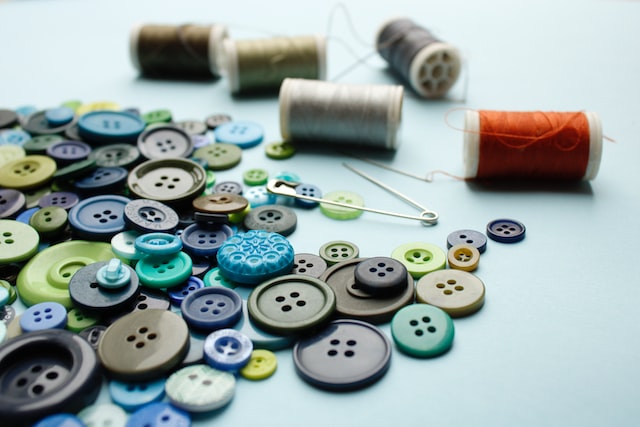
If a button comes off your coat or waistcoat, it meant business misfortune, and it was a bad omen if three buttons came off your shoes in a row. Knocking over a box of buttons was also bad luck (Daniels 2003 [1903]: 420).
That said, it was considered lucky to find a button from some trousers (Daniels 2003 [1903]: 420).
Women also used buttons as a wedding divination. They would count their buttons, saying “Silk, satin, calico, rags” for each button. They would be comfortable, hard-working, or poor, depending on where they got in the list at the last button (Daniels 2003 [1903]: 106).
What do we make of the folklore of accessories?
Some of this folklore can be quite contradictory. Part of that is due to the fact that many superstitions come from different places and when they’re collected, they’re jumbled up and lumped together.
But many of them relate to the way in which you wear the accessory since they can be worn in different ways, as if you’re sharing a secret code. Gloves are also quite pliable, giving them movement and flexibility so you can do more with them than you can something like a shoe.
These are also items that a lot of people would have had, recognised and carried around with them. Carrying them left them free to drop or leave them behind.
But it was really interesting to see that example of the rally cap from modern day baseball. It shows how some of these traditions and superstitions do continue. They evolve or sometimes they just appear out of nowhere, and catch on, which is folklore in action.
How many of these superstitions have you heard before? And how many of them do you actually do?
References
Daniels, Cora Linn and C. M. Stevans (eds) (2003 [1903]), Encyclopaedia of Superstitions, Folklore, and the Occult Sciences of the World, Volume 1, Honolulu: University Press of the Pacific.
Destefano, Carl, & Hand, Celeste (1969), ‘Folk Beliefs about Clothing’, Western Folklore, 28 (1), pp. 49–49.
Opie, Iona and Moira Tatem (2005), Oxford Dictionary of Superstitions, Oxford: Oxford University Press (affiliate link).
Nutty about folklore and want more?
Add your email below and get these posts in your inbox every week.
You'll also get my 5-step guide to protecting your home using folklore!

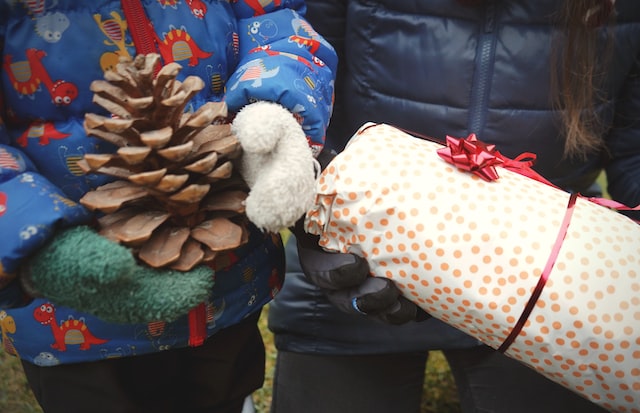
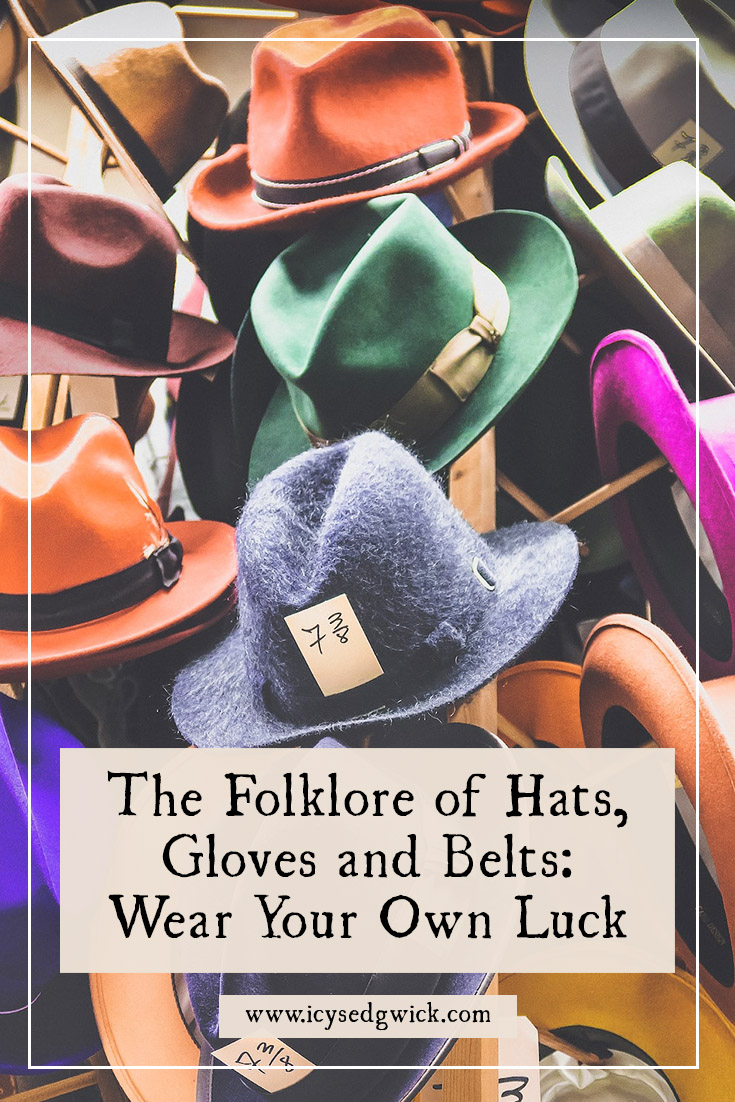






I’d never heard any of these before. I do know slapping someone across the face with a glove was a challenge to a duel. Though, what if a woman slapped another woman with her glove? And do the same ideas apply to mittens?